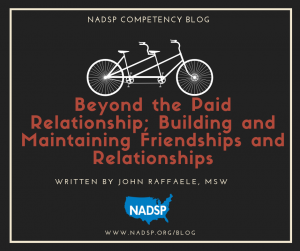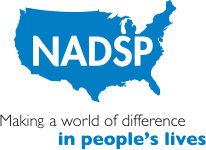Direct support is a profession that depends on a “relationship”. That relationship is the one that is developed and fostered between the direct support professional and the person supported. This may state the obvious but often when direct support professionals review the NADSP Competency of Building and Maintaining Friendships and Relationships they sometimes don’t see past that professional relationship. There is usually a strong bond and connection that develops between DSP and person supported and that is a very important thing. However, the spirit of the competency pushes direct support professionals to be gatekeepers and ambassadors for people to develop relations beyond their professional paid relationship.
A complicated part of the NADSP Competency of Building and Maintaining Friendships and Relationships is how do direct support professionals encourage and assist people they support to get out of their “comfort zone”? People who receive supports from direct support professionals can see that relationship as a friendship and be satisfied with that alone. This is controversial and the NADSP has investigated this issue in webinars, training and lots of social media engagement. This blog is not going to address this. The competency demands that direct support professionals assist people in learning about and accessing their communities, meet people beyond the service setting and promote friendships and relationships. The direct support professional also works closely with family members and guardians thus, they need to be able to assist the person they support in navigating those relationships.
When a direct support professional abides by the skill statements listed in the competency of Building and Maintaining Friendships and Relationships, there is a likelihood that human interaction and community integration and inclusion will transpire. When people with disabilities have visibility and connection to their respective communities there is a natural development of friendships and relationships. The role of the direct support professional is crucial in this context. Direct support staff may need to interpret for the people they support. Direct support professionals may need to teach community members about the best ways to communicate with a person with whom they are supporting. People with disabilities may need accommodations and advocacy to access facilities and attractions in the community.
It is direct support professionals who are the engineers and conductors of these activities. When the competency of Building and Maintaining Friendships and Relationships is embraced and utilized people with disabilities will be able to expand beyond the “paid” relationships and enjoy the types of friendships and relationships that all non-disabled citizens enjoy.
On July, 11th, John and Dan Hermreck, Director of Certification and Accreditation will take a deeper dive on the competency during our Lunch and Learn. For more details on the webinar, click here.

Excellent perspective. Thank you for reminding me that Guiding my consumer to self assurance is a major goal in my duties.